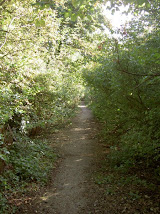So, this 'blog is primarily dedicated to the discussion of all things fantastic. I prefer it that way, for I dearly love fantasy, and as I discussed in the last post, I dearly love the myth that fantasy drew from. However, I felt a need to write a brief comment on fantasy's cousin science fiction.
I say cousin, but they aren't really cousins, although they are often lumped together. Part of this, I believe, comes, perhaps on the speculative nature of them both. Some of this comes from a sort of blurring of the lines in movies such as Star Wars, which has blasters and starships, but is in all its particulars, except for set dressing, a fantasy film. Space fantasy to be sure, but fantasy. Even more thorny are shows such as Star Trek, which is more scientific than Star Wars, but which is still, in terms of real science, not very scientific. This is all to say, that just as fantasy runs the entire gamut from high to low, swords and sorcery to epic, so there is also a spectrum for science fiction, based primarily on the grounding of its speculations in actual science. At the far end of the spectrum, closest to fantasy are films and books such as Star Wars. At the opposite end is the hard science fiction, preferred by thos great science fiction authors such as Arthur C. Clarke, Robert A. Heinlein and Isaac Asimov.
I enjoy the whole spectrum, unlike, my wife, for example, who prefers fantasy almost to the exclusion of science fiction. Some of my favourite books have been science fiction, especially books by Clarke and Heinlein. My wife is not alone, however. Fantasy, especially juvenile fantasy, is very trendy right, likely in the light of the successes of books series such as Harry Potter. It is interesting to me that one may read Harry Potter and his companions, good and bad, and still not have to worry about losing your high school status as a "cool kid" (this is a gentle ribbing to all those "Mormon Mommy 'Bloggers" who loved Twilight, but would be horrified to hear it described as fantasy), but Asimov and Heinlein are still the domain of the geek.
So, I have certain geek tendencies, although social awkwardness is not really one of them, my wife would hasten to add. Regardless, science is an important part of our world-view, and I personally think that science needs science fiction. After all, every religion needs its myths.... In all seriousness, I suppose the primary purpose of this post was to encourage my readers who love fantasy (and if you don't, you are unlikely to read me more than once)to branch out a little bit and try some science fiction. I'd start with something accesible, like Clarke's brilliant 2001: A Space Odyssey or if you like a little bit of philosophy with your reading, Heinlein's Starship Troopers walks an excellent line between a discussion of the rights of citizenship and a rollicking adventure yarn. To my readers who already read science fiction, let's read some more.
Excelsior (ad Astrum.)
Thursday, April 09, 2009
Subscribe to:
Post Comments (Atom)


5 comments:
I always worry going into the realm of science fiction, but then again, some of my favorite books from our forced readings in school were science fiction, i.e. Fahrenheit 451, etc.
I'm still preferential to juvenile fiction generally (at least during school - can't spare much brain power) and just realized one of my recent 'reads' would probably be considered science fiction - The Hunger Games. Quite accessible, I thought. Good story line, not too obvious, but yet not too out there.
That's all.
I love 'em both — science fiction or fantasy; matters not to me. I love to have some element of the out of the ordinary in my reading. That said, I haven't read much "pure" science fiction lately, and could never acquire a taste for Asimov or Clarke, much to my detriment.
Heinlein, though, is one of my favorite authors, and I had the honor of meeting the meeting the old giant in person in the mid-seventies, which made HUGE impression on a 14 year-old. By accident or design, he came across like a character from one of his novels.
I love mid-period Heinlein like "Starship Trooper." It's part top-drawer adventure story, and part philosophy debate. Heinlein, or "the old man" as I call him, was never one to let the science drop, either. As close as there is to a perfect science fiction writer, 'though some of his later work veers toward NC-17. Just a warning.
Seems like it's easier for science fiction to crossover into pop/mainstream/whatever-you-want-to-call-it adult literature, like with Clarke or Asimov or even Neal Stephenson. However it seems like when "young adult" fantasy crosses over, it does it in a big way (Harry Potter, Twilight). I wonder why that is.
Glenn--I actually haven't read much Heinlein, for the very reason you indicate. Troopers and some of his juveniles. I don't have much of a taste for Asimov either, although when I get time (ha, ha) I intend to work my way through the Foundation series. Of three, I think Clarke is the best writer, especially of short fiction.
Sarah--it is unusual that fantasy tends to cross over big, but sci-fi is generally more mainstream. I once thought that this was some sort of microcosm of the eternal sciences versus the humanities debate, but that may be giving the question a dignity it does not deserve.
I think that perhaps why YA fantasy crosses over so much is that people are predisposed to like fantasy (from children's movies and fairy tales, on up), but don't perceive themselves as fantasy readers - they perceive themselves as mainstream. So books like HP or twilight transcend the "stigma" of fantasy, and become mainstream.
I've been amazed by the number of women who consider Twilight to NOT be fantasy, or to be barely fantasy. Since it's packaged to be "mainstream" (some of the complaints of the Mormon Mommy Blog world of the last book was it was too fantasy like, or made them feel like they were reading a fantasy).
I think that SF seems more adult, and some of the changes can seem more "realistic" - not cause for people to feel that they're being weird, or "nerdy" or different.
NOT that this is fine literature, or literature at all, but I'm a little amazed at the somewhat mainstream approach to World of Warcraft. To me it seems very niche and fantasy, but I'm continually amazed at the larger sphere of people that play it - people who would sneer at similar fantasy roleplaying, and who also probably never read fantasy in their life.
Post a Comment